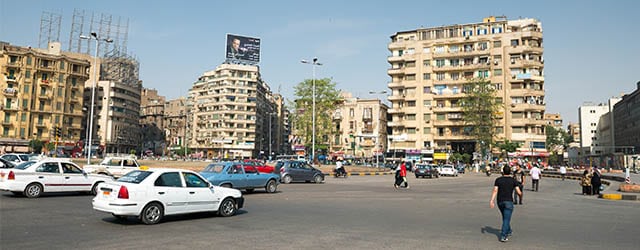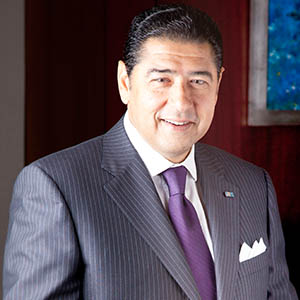Egypt may be on the verge of a major turnaround, as the most populous country in the Arab world looks set for sustained growth, lower unemployment and a manufacturing renaissance under president Abdel Fattah al-Sisi.

Economists ranging from the major rating agencies to the IMF agree that Egypt is hitting the right notes If the new government continues to get the basics right in terms of economic policy, they say, the nation could be entering a phase of real GDP growth of 5% annually, which would certainly ease the country’s high unemployment rate. With a fast-growing population of nearly 90 million and a low-wage workforce, Egypt is well positioned to become a manufacturing hub for Europe. The Suez Canal, moreover, which provides ready access for Egyptian goods to global markets, is being upgraded to handle two-way traffic to reduce transit and waiting time and boost revenue.
Egypt’s economy expanded by 4.3% in the fourth quarter of 2014, after three years of political turmoil when growth averaged 2%. There are tentative signs that investment is picking up, and tourists are trickling back to the pyramids. The year-old government of president Abdel Fattah al-Sisi, former head of Egypt’s armed forces, has restored a sense of relative security.
A new law eliminated many bureaucratic and legal obstacles to foreign direct investment. The recent Egypt Economic Development Conference in Sharm El-Sheikh attracted over 1,700 investors and government officials from 100 countries and international organizations. Nearly $40 billion of investment deals were signed, mainly in the energy and power sectors.
“The improvement in the political situation and signs the government is embarking on reforms have triggered a pickup in foreign investment,” says Jason Tuvey, Middle East economist at Capital Economics, noting that the Gulf States have pledged an additional $12.5 billion in financial support for Egypt, made up of deposits at the central bank, free petroleum shipments and investments.
The outlook for the North African economies of Egypt, Morocco and Tunisia has brightened over the past 12 months, and growth could strengthen across the board again this year, Tuvey says. Looking ahead, he adds, “low income levels and rapidly growing populations mean annual GDP growth of 5% to 6% is not out of the question.” In theory, relatively poor countries can grow much faster than richer ones by replicating technologies and production techniques from the developed world and shifting workers from low-productivity sectors (like agriculture) to high-productivity sectors (like manufacturing), Tuvey says.
So Egypt should experience both “catch-up” growth after the slowdown caused by the Arab Spring uprisings, as well as an incremental 1% growth annually purely by absorbing new entrants to the labor market, Tuvey says.
Earlier this year the International Monetary Fund (IMF) concluded its first Article IV consultations with the Egyptian authorities since 2010. “Following four years of political uncertainty and economic slowdown, Egypt has chosen a path of adjustment and reform that, if followed resolutely, will lead to economic stability and growth,” the IMF said.
President Sisi has slashed energy subsidies and introduced new taxes in early moves to restore fiscal stability following elections in late May of 2014. The IMF says a more flexible exchange rate, avoiding real appreciation of the currency, would improve the availability of foreign exchange, strengthen competitiveness and attract foreign investment.
Annual GDP growth of 5% to 6% is not out of the question.
~ Jason Tuvey, Capital Economics
After allowing the Egyptian pound to depreciate by 6% against the dollar earlier this year, the Central Bank of Egypt has kept a tight grip on the currency in the past few months, Tuvey says. The pound has held steady at 7.63 to the dollar: it needs to fall to around 8.25 to help restore external competitiveness.
With the nation’s inflation rate likely to drop significantly later this year, Capital Economics expects the central bank to cut its overnight deposit rate by 50 basis points to 7.75%.
The IMF says the Egyptian banking system, starting from a relatively strong position, has been resilient in the face of economic and political uncertainties of recent years, maintaining profitability, a low level of nonperforming loans and high liquidity.
Ashraf Al Ghamrawi, vice chairman and CEO of Al Baraka Bank Egypt, says he’s optimistic about the outlook for the banking sector. “As as a result of the [return to] political stability and of economic reforms, Egyptian banks will issue more loans and financing to the private sector as the economy improves.”
Banks will continue using surplus liquidity to buy government bonds, Ghamrawi says.

Hisham Ezz Al-Arab, chairman and managing director of Commercial International Bank (CIB), says the new investment law, which allows the General Authority for Investment to act as a one-stop-shop for investors, “has tackled the obstacles that had been deterring the progress of FDI. Previously, foreign investments were vulnerable to legal challenge, and investors had to deal with a staggering 78 different government bodies for permits and approvals.”
The law also exempts foreign investors from criminal liability in legal disputes over corporate violations, Al-Arab notes. It will impose fines and revoke licenses instead.
Egypt’s banks have a critical role in supporting the central bank’s financial inclusion initiative, Al-Arab says, “considering that 75% of the population is underbanked.” The government has decided to pay government employees via debit cards, migrating their payrolls into banks. “The more than five million new cards will spread and reinforce the banking culture.”
Meanwhile, the Egyptian Exchange, the top-performing market in the Arab world last year, is attracting a flurry of initial public offerings, including Edita Food Industries and Orascom Construction. Egypt’s state-owned petroleum companies are next up: They are planning to raise about $2 billion.
In another show of strength, all of the major rating agencies have upgraded the country’s credit rating and outlook since December 2014. This is a welcome development at a time when Egypt is preparing to return to the international bond market–it recently hired seven banks to arrange a $1.25 billion issue. n
GFmag.com Data Summary: Egypt
Central Bank: Central Bank of Egypt |
|||
|---|---|---|---|
|
International Reserves |
$ 16.5 billion |
||
|
Gross Domestic Product (GDP) |
$ 286.4 billion |
||
|
Real GDP Growth |
2012 |
2013 |
2014 |
|
GDP Per Capita—Current Prices |
$3,303.75 |
||
|
GDP—Composition By Sector* |
agriculture: |
industry: |
services: |
|
Inflation |
2012 |
2013 |
2014* |
|
Public Debt (general government |
2012 |
2013* |
2014* |
|
Government Bond Ratings |
Standard & Poor’s |
Moody’s |
Moody’s Outlook |
|
FDI Inflows |
2011 |
2012 |
2013 |
* Estimates
Source: GFMag.com Country Economic Reports



